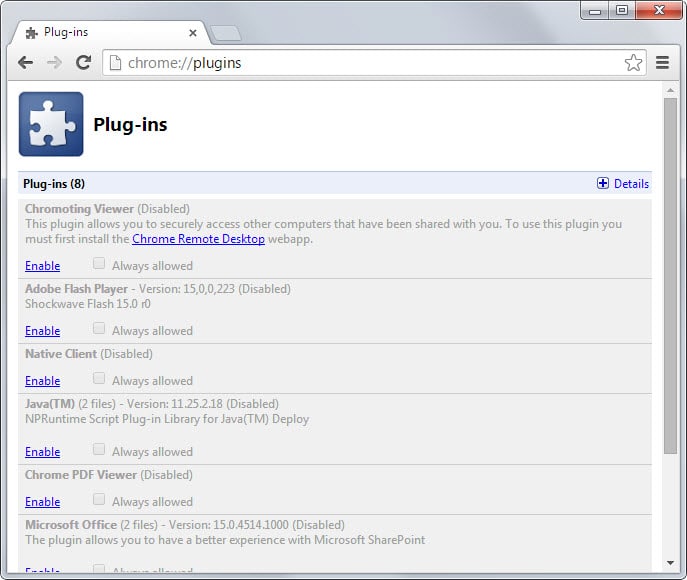How to re-enable plugins in Chrome that are blocked by Google starting 2015
Web browser plugins are being used by many Internet users even though their use is in decline. Most companies that produce browsers try to get away from the plugin architecture, or at least the old one that has been in use since the Netscape days.
Reasons for doing so are security, stability and support for mobile devices.
Google announced in 2013 that it will start to block old NPAPI plugins in the Chrome browser eventually and started in January 2014 to reduce the impact that plugins have in the browser.
Chrome is currently allowing whitelisted plugins to run while all others are blocked automatically.
The company announced today that it will start to block all NPAPI plugins in all versions of Google Chrome starting January 2015.
The timeline looks like this:
- January 2015 -- Google removes the whitelist which allows popular plugins to be run currently in the browser. Whitelisted plugins are Silverlight, Unity, Google Earth, Java, Google Talk and Facebook Video. This means that all NPAPI plugins are blocked from running in Chrome from that month onwards.
- April 2015 -- NPAPI support is disabled in Google Chrome and all browser extensions that require NPAPI plugins will be unpublished from the Chrome Web Store.
- September 2015 -- The company will disable the override that companies and individuals can use to enable NPAPI plugins.
Google published usage information of popular plugins and all are on the decline. Silverlight usage fell from 15% in September 13 to 11% in October 14. Java dropped from 8.9% to 3.7% and Unity from 9.1% to 1.9%.
Flash is not affected by the move in Chrome as Google is maintaining a custom version of Flash called Pepper Flash that uses a new plugin framework specific to the browser.
Workaround until September 2015

Users and organizations who need to use plugins in Chrome can do so until September 2015 provided that they re-enable the use of NPAPI plugins in the browser.
Google plans to implement an override, accessible on the browser's experimental page: chrome://flags/#enable-npapi
When set to enabled, it will re-enable support for NPAPI plugins.
This override re-enables NPAPI so that plugins can still be used. This option will be removed in September 2015 and close down any possibility to run these types of plugins in the browser.
The only option remaining at that point in time is to switch to another browser that still supports plugins.
Tip: a list of plugins recognized by the browser is available when you load chrome://plugins in the address bar.
Enterprise users can use the EnabledPlugins policy to enable specific plugins. The option won't be available anymore after September 2015 as well.
Now You: What's your take on Google's move? Good, too early, bad?
This article was first seen on ComTek's "TekBits" Technology News

- Log in to post comments